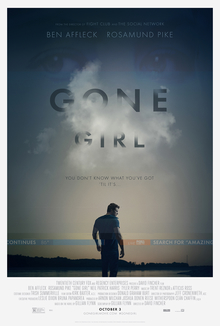
Released: October 3rd, 2014
Rated: R
Studio: 20th Century Fox
Starring: Ben Affleck, Rosamund Pike, Neil Patrick
Harris, Tyler Perry, Carrie Coon
Directed by: David Fincher
Written by: Gillian Flynn
Personal Bias Alert: Read the book, hit and miss with Fincher
6.8 of 10
The
similarities between Gone Girl and director
David Fincher’s previous film, The Girl
with the Dragon Tattoo, are remarkable.
Both are based on popular crime novels where the flashiest character is
a smart woman who refuses to get taken advantage of. Take a look at the two leads below. Which do you think is the sane one?
Looks can be
deceiving, which is a running theme in both pieces. Gone
Girl explores the assumptions that are made when a well-to-do young woman goes missing in America’s heartland. The missing woman is Amy Dunne (Rosamund
Pike), the unhappy wife of Nick Dunne (Ben Affleck). Unhappy might be an understatement considering
she’s left behind a diary that details a crumbling marriage and a growing
concern that her husband might have had enough of her. As the blame quickly falls on Nick, he
struggles to assert his innocence against the mounting evidence and the rabid
media that’s latched onto the
story.
With
Pike gone for a large portion of the film, the true lead is actually Affleck,
who’s brilliantly cast as the type of guy everyone would look at and assume
might kill his wife. He’s got a winning
face, the kind that might have allowed him to get too much too easy, and Nick’s
reserved, Midwestern politeness doesn’t make for the distraught husband
everyone wants to see. Note that I was
talking about Nick at the end; Affleck isn’t a Midwesterner, nor do I think he
might kill his wife (I’ve seen Alias,
Garner can take care of herself). Nature
might have given Affleck the perfect look for this character, but it’s his
great performance that carries the film.
Pike
arguably has the more complicated role, appearing largely in flashback and
rarely getting to show Amy’s true nature. Pike struggles to make Amy feel real, and
while there’s moments that work, the performance feels strained. The same goes for most of the rest of the
cast, although there are two standouts besides Affleck. Kim Dickens excels as the hometown detective
assigned to the case, playing into the looks can be deceiving theme by showing
good instincts and solid detective work.
On the other hand, Neil Patrick Harris is entirely out of his depth as a
suspicious former boyfriend of Amy’s.
Harris,
Pike, and everyone else’s struggles date back to the book, in which novel and
screenplay writer Gillian Flynn must have valued pace and theme over
characterization. Several of the
characters were left feeling pretty thin, and their behaviors were often erratic. The worst was Amy, who never made sense to
me. It’s disappointing to say, because
so much of the book and the movie are so good, but the ending takes Amy and
others too far off the rails. I
understand that it was just going for some crazy fun, but I didn’t buy it.
Fincher
is good at making these sorts of stylish thrillers, and his eye for detail
makes for a great looking film. However,
the time restrictions that come with adapting a dense, 432 page novel show. The beginning and end feels rushed and
features some odd edits that cut off prematurely, making it hard for me to get
emotionally invested and truly absorbed by the film. More time is given to the outstanding middle
section, and the movie almost becomes something truly great until that
off-putting ending. Still, that Fincher
style is always interesting to look at, even if his films sometimes get
strangled by it.
What
I realized at the end of this book, and what I remembered at the end of this
film, was that Gillian Flynn must have been far more interested in giving us a
pulpy thriller than in exploring the story’s interesting themes. It’s frustrating, because most of the story
is a great intersection of entertainment and ideas. If Flynn had found a way to land the ending
that satisfied both sides, then this would have been an excellent piece of
work. Instead, it throws it all away in
favor of a shocking ending that left most people in my theater shaking their heads.
Other Notes:
Ø I
loved the moments where you could see people’s sweat stains.
Ø I
don’t know if Affleck was beefing up for Batman
V Superman during filming or if they just hid his body better in some
scenes, but there were jarring variations in how big he looked.
Ø Boy,
it’s been a while since Almost Famous.

No comments:
Post a Comment